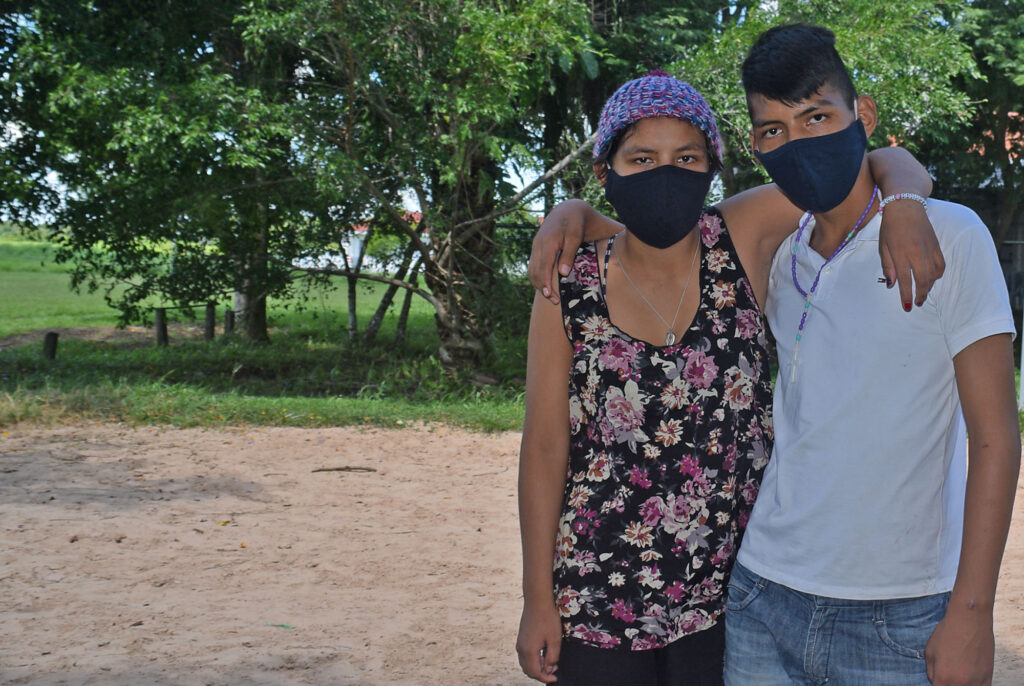From troubled boy to example for others
Milton was four when his mother passed away. With his grandfather struggling to manage their behaviour, Milton and his sister Melisa joined NPH Bolivia in 2016 when they were 10 and 12 years old. Since then, they have received psychological support to cope with childhood traumas and their positive behaviour and attitudes have made them role-models for other children. Both now dream of starting university in the future.

Tragic loss at an early age
Milton finds it hard to recall parts of his childhood. He comes from Okinawa, a small town located 146km northeast of Bolivia’s second city, Santa Cruz, where over half the population live in extreme poverty. He never met his father and his mother died from a rare illness when he was just four years old in front of him and his sister. Milton struggles to talk about it even now at age 15. “I watched on as she left us. Her whole body was swollen. At first, it began in her stomach; she thought she was pregnant but then it spread to her whole body,” explains Milton.
Willy Pedraza, NPH Bolivia social worker, tells us about Milton’s difficult early childhood. “Sadly, the two siblings pretty much grew up on the streets because their home was too small. They used to look for food by themselves and suffered from poor hygiene. Both of them were struggling with learning. Milton’s behaviour towards other children was challenging and he had difficulty following rules.”
A family struggling to cope
Milton and Melisa shared an overcrowded home with a large extended family consisting of one bedroom where they all slept, a kitchen and a bathroom. Sometimes, family members found temporary work at the local school or informal employment working on farmland, but Milton can recall the struggle to put food on the table.
After the traumatic death of Milton and Melisa’s mother, their grandfather took care of them with a little help from an aunt, “He was a good man. He tried to take good care of us. We were very boisterous and it was hard for him to control us. We often went to play football in a nearby field and we would come back very late. Sometimes the doors were locked, so we stayed on the streets all night,” admits Milton, smiling.
The chance to get help at NPH Bolivia
Neighbours witnessed the situation spiralling out of control and contacted social services due to concerns about the children’s behaviour and poor nutrition. The authorities came to investigate and saw the tough living conditions for themselves. They referred the case to the court in Santa Cruz which recommended that Milton and his sister live at NPH Bolivia. Here they would have a healthier, safer and more stimulating upbringing, and help to overcome their behavioural challenges.
On arrival at Casa Padre Wasson, the NPH psychology department quickly noticed that Milton struggled to contain his emotions and had an undisciplined attitude. “Milton could not control his impulses and it was difficult for him to recognise his emotions. He also had challenges adapting to the rules,” says Lena Saavedra, an NPH Bolivia psychologist.
A journey of recovery and transformation
Lack of nutrition, depression over the loss of his mother and a poor social environment all contributed to Milton’s challenges. Still, Lena was impressed with his determination to overcome them. In 2018, he was diagnosed with a neurological condition and received psychiatric treatment to improve his behaviour.

“My life has changed for the better and I am very thankful.” Now Milton feels part of a family, and although he loves drawing and writing, he says he wants to be a gas engineer when he grows up. He shows off a picture collage he made of his childhood, which also contains pictures with volunteers and caregivers at NPH. The name of the album is “My life”. He says it was an important part of his therapy, a task set by the psychology department that helped him come to terms with his traumatic childhood.
Milton now likes to offer his help to the caregivers in the home with younger members of the NPH family. “Milton is a very dedicated boy. He is always wondering how he can help and takes every task delegated to him very seriously,” says Willy, proudly.
The NPH nurse, Verónica Rivera, agrees, adding that Milton’s behaviour is an example for other children. “In his treatment, he is receiving neurological stimulation. He has monthly psychiatric appointments and this has helped him very much. Now, he is not just adapting; he is also helping his NPH siblings and being a role model for others.”
Happier times and a bright future
Milton still enjoys running in the fields, climbing trees and playing football. His sister Melisa’s life has also greatly improved with psychiatric and medical care. They like to talk often, sharing their drawings and photographs. She loves music with inspiring lyrics and Milton always finds ways to make her smile. When a birthday comes, they try to surprise each other, and like most brothers and sisters, they always take care of each other.
Milton’s and Melisa’s lives are now better, not just physically, but emotionally, with the support of the NPH family. “I am happier now, I have a family and I feel healthy,” smiles Milton proudly.
You can make a difference
You can make an impact by supporting the health and emotional welfare of vulnerable children at NPH like Milton and Melisa.
Annual salary of a psychologist: £6,400
Cost of a neurological and psychiatric programme: £2,000 a year
Your donation will help us provide essential treatment to transform children’s lives.
*Privacy note
Children’s names, marked with an asterisk, have been changed to protect their privacy.
